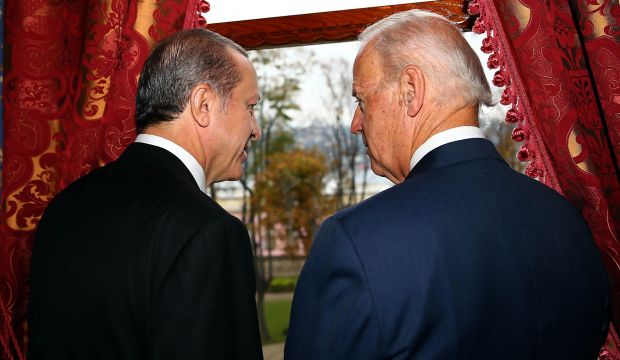
Turkish President Recep Tayyip Erdoğan (L) and US Vice President Joe Biden chatting during their meeting in Istanbul, Turkey, on November 22, 2014. (EPA/Kayhan Ozer/Presidential Press Office)
Beirut, Asharq Al-Awsat—US Vice President Joe Biden wrapped up his visit to Turkey on Sunday, after meeting with Prime Minister Ahmet Davutoğlu and President Recep Tayyip Erdoğan in a bid to gain more support from Ankara against the Islamic State of Iraq and Syria (ISIS).
Turkey has been a reluctant member of the anti-ISIS coalition assembled by the US, receiving criticism from other members regarding the flow of fighters belonging to the extremist group across its borders, among other issues.
Ankara insists the fight against ISIS must also encompass serious efforts to topple the Syrian regime led by President Bashar Al-Assad, and the establishment of safe zones within Syria along the Turkish border to safely house the millions of refugees which have entered Turkey since the start of the conflict.
Biden’s four-hour meeting with Erdoğan on Saturday followed meetings with Prime Minister Davutoğlu and is part of a recent US push for greater Turkish involvement in the coalition, with three high-level US political and military figures visiting the country in as many days.
“On Syria, we discussed . . . not only [ways] to deny [ISIS] a safe haven and roll back and defeat them, but also strengthen the Syrian opposition and ensure a transition away from the Assad regime,” Biden said in a joint press conference with Erdoğan following the meeting.
For his part, the Turkish president called the meeting with Biden “very important” in terms of preserving “regional and global peace and stability,” and stressed his desire to “align the points of view of the US and Turkey regarding many of the topics we discussed.”
Official Turkish sources, however, told Asharq Al-Awsat the talks “did not lead to any major breakthroughs” on the issue of Turkey’s greater involvement in the coalition, with Ankara remaining insistent on its existing conditions.
Speaking to Asharq Al-Awsat via telephone, Osman Sirt, a close aide of Davutoğlu, said Ankara’s main concern remained fighting Assad as well as ISIS.
“Turkey believes that everyone is talking about ISIS and the importance of fighting it. But what is certain is that it is Assad who is responsible for everything that has happened in Syria, and it is impossible for him to be involved [in Syria’s political process] in any way, shape or form following the end of his rule,” Sirt said.
“All we [Turkey] want is for the Syrians to choose who will be in power,” he added.
During his trip, Biden also echoed recent criticisms in the West of Erdoğan, regarding what is seen as an increasing authoritarian trend in his leadership.
Speaking to Turkish civil society groups, Biden indirectly criticized the concentration of powers in Erdoğan’s hands, in apparent reference to the Turkish president’s recent assumption of the previously ceremonial post after 12 years in power as prime minister, and the fact that his party currently holds a majority in the Turkish parliament.
“Our founders concluded that a concentration of powers was the most corrosive thing that can happen to any system,” Biden said. “We still believe that.”
He added: “The best way to preserve freedom is not to have too much power concentrated in any branch of government.”
